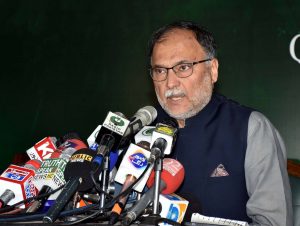Using data from the next census conducted digitally: Iqbal’s ministry of planning requests that PTI hold new elections.

ISLAMABAD: Planning Minister Ahsan Iqbal stated on Tuesday that the 7th population and housing census (digital census), which would be conducted in October 2023, will serve as the basis for the country’s upcoming general elections.
The minister said that the future general election would take place in October 2023 based on the results of the digital census while speaking at the opening ceremony for the training of master trainers for the 7th population and housing census. In April, the census results will be released, and the Pakistani Election Commission will subsequently define the constituencies.
The minister stated that the Sindhi government has concerns about holding elections based on the results of the most recent census.
According to him, the government would spend roughly Rs 34 billion on this crucial effort that would aid in the formulation of economic policies and ensure the equal allocation of resources among all key players for the nation’s development.
The first digital census, he added, would hasten the completion of the process and the government is granting Rs13.5 billion to the National Database and Registration Authority (NADRA), which will organise digital solutions.
He added that this census will also ascertain whether the population was on a rising or falling trend and that an offline data collection system would be accessible for places without internet access.
According to the minister, the government is required by the constitution to conduct a census in order to calculate the National Finance Commission Award and allocate resources for the equitable development of all areas.
Pakistan, according to Ahsan Iqbal, is one of the nations with a fast increasing population. According to him, the population growth has reduced access to fundamental civic amenities like clean drinking water, health care, and education, while also lowering per-person water and agricultural land availability.
He claimed that a substantial portion of the local population was made up of young people, which was advantageous if we could give them access to quality training and education for the nation’s economic growth. In the meanwhile, he claimed, growing polarisation would drive this national dividend toward radicalism, and he urged striking a balance between resources and difficulties.
According to the minister, political stability, adequate time, and consistent policies are all necessary for achieving economic stability. He claimed that the current government’s crisis was brought about by the previous administration’s incompetence and poor leadership.
However, he claimed that the government had avoided the default issue on the international front, made difficult choices, and was upholding all agreements made by the previous administration with multilateral organisations.
He claimed that recent flash floods and rains, which mainly struck the provinces of Sindh and Balochistan, caused the nation to endure another shock of $30 billion.
He said that the government had likewise been successful in overcoming this obstacle. According to him, restoration and rehabilitation efforts were already under way in all impacted locations and would continue up until the last affected person had found a place to live.
In order to raise approximately $16 billion for the restoration and rehabilitation of flood victims, Ahsan Iqbal stated that the government planned to host the Climate Resilience Meeting the following month. He also added that friendly nations will attend the conference.
Imran and ‘powerful quarters’
Later, in a television interview, the minister asserted that the Imran Khan-developed narrative had been “badly battered and exposed” in the local body election in Azad Jammu and Kashmir, where other parties had won 70% of the seats.
Imran, he claimed, had begun a “complete propaganda campaign” against national security organisations and had not even shown mercy to the officers who lost their lives in a helicopter crash.
Despite having the complete support of influential people, according to Ahsan Iqbal, the former prime minister was unable of leading the nation due to his incapacity. He continued by saying that even if Imran had been given “a free hand,” he was still allowed to manage the affairs.
He continued by asserting that the PTI would not have been able to form a government in Khyber Pakhtunkhwa either if the 2018 general elections had been free and transparent. Imran’s government was the first to receive backing from the judiciary and establishment, he continued.
The minister lamented that, in spite of all, the PML-N was given unfair treatment.
Ahsan claimed that corruption and looting were rampant in Punjab, where the PTI is currently in power. “At the moment, no officer wants to be appointed Punjab’s chief secretary or IG.”
In order to guarantee a free, fair, and transparent general election, the minister asked the PTI to return to assemblies and participate in the electoral reforms process.
He continued, “The nation cannot afford another political crisis in the wake of the next general election; stability and continuity of programmes are required if we are to advance in the correct way.
Economic difficulties are “temporary.”
The minister clarified that there was no concern about an economic default because the fundamentals of the economy were strong, and he said that the current economic difficulties, brought on by the previous administration, were just transitory.
In addition to raising additional money, Ahsan Iqbal emphasised the importance of expanding exports, managing the importation of luxury items, and encouraging foreign direct investments.










































